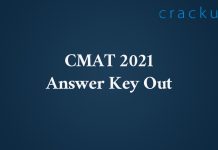CMAT Pipes and Cisterns Questions [Download PDF]
Pipes and Cisterns is one of the most important topics in the CMAT, and also it is an important section. One can utilize this article which consists of the most important questions regarding Pipes and Cisterns. Cracku provides you with the Top 20 very Important Pipes and Cisterns Questions for CMAT based on the questions asked in previous exam papers. Click on the link below to download the Pipes and Cisterns Questions for CMAT PDF with detailed answers.
Download Pipes and Cisterns Questions for CMAT
Enroll to CMAT 2023 Crash Course
Question 1: Two pipes P and Q can individually fill a tank in 60 minutes and 40 minutes. If pipe Q alone is open for the first half an hour and then pipe P is also turned on, in how many minutes more will the tank get filled up?
a) 4 minutes
b) 8 minutes
c) 6 minutes
d) 10 minutes
1) Answer (C)
Solution:
Work = efficiency $\times$ time
Work=LCM(60,40)
=120
Quantity filled by P in 1 hr =$ \frac{120}{60} $
= 2
Quantity filled by Q in 1 hr =$ \frac{120}{40}$
= 3
Efficiency of pipe P = 2
Efficiency of pipe Q = 3
Work done by pipe Q alone for the first half an hour = $ 30 \times 3 $
= 90
Work done by pipe P and Q for the remaining time t = $ t \times (2+3) $
= $ t \times 5 $
Thus total work done,
$ 90 + 5 \times t = 120 $
Solving, t=6 minutes
Question 2: Two pipes can fill a tank in 5 and 6 hours respectively. A third pipe will empty it in 12 hours. If all the pipes are opened, then find the time taken to either fill or empty the tank.
a) Filled in 30/17 hours
b) Filled in 60/17 hours
c) Filled in 30/11 hours
d) Emptied in 9/2 hours
2) Answer (B)
Solution:
$ work = efficiency \times time $
P1,P2 and P3 be the pipes
P1 fill the tank in 5 hrs
P2 fill the tank in 6 hrs
P3 empty the tank in 12 hrs
work done = LCM of P1,P2 and P3 = LCM (5,6,12) = 60
efficiency of P1 = $ \frac{60}{5} = 12 $
efficiency of P2 = $ \frac{60}{6} = 10 $
efficiency of P3 = $ \frac{60}{12} = 5 $
efficiency of P1 + P2 + P3 = 12 + 10 – 5 = 17
$ 60 = 17 \times time $
$ time = \frac{60}{17} hrs $
Question 3: Two pipes P, Q can fill a cistern in 12 and 15 minutes separately. P is open for 4 minutes and turned off. In how much time will the remaining part be filled by Q?
a) 9 minutes
b) 11 minutes
c) 10 minutes
d) 12 minutes
3) Answer (C)
Solution:
Two pipes, P and Q, fill a tank in 12 Min and 15 min respectively. That means,
Let total tank capacity 60L

that mean
P filled tank in 1 minute=5L
Q filled tank in 1 minute=4L
tank filled by P in 4 min is $=4\times5$
= 20
Then Pipe P is closed
So tank Capacity left 60-20=40
i.e filled by Q only
Total time taken by Q to filled remaining part of tank is
$\frac{total tank capacity left}{Efficiency of Q}$
$=\frac{40}{4}$
=10 minutes
So, the time taken by Q is 10 minutes
Question 4: Two pipes can fill a tank in 30 minutes and 60 minutes respectively. Another pipe at the bottom will empty it in 120 minutes. If all the pipes are open, in what time will the tank get filled?
a) 24 minutes
b) 40 minutes
c) 52 minutes
d) 50 minutes
4) Answer (A)
Solution:
$ work done = efficiency \times time $
work done = LCM( 30 , 60 , 120 ) = 120
efficiency of pipe P1 = $ \frac{120}{30} = 4 $
efficiency of pipe P2 = $ \frac{120}{60} = 2 $
efficiency of pipe P3 = $ \frac{120}{120} = 1 $
If all the pipes are open, in what time will the tank get filled $ time = \frac{120}{5} = 24 minutes $
Question 5: Two taps P and Q can fill a cistern in 30 and 20 minutes respectively. Both P and Q were opened for a few minutes after which P was closed. The rest of the cistern was filled by Q in 5 minutes. After how many minutes was pipe P closed?
a) 10 minutes
b) 12 minutes
c) 9 minutes
d) 8 minutes
5) Answer (C)
Solution:
$ work done = efficiency \times time $
work done = LCM( 30,20)
= 60
efficiency of pipe P = $ \frac{60}{30} = 2 $
efficiency of pipe Q = $ \frac{60}{20} = 3 $
according to question
$ ( efficiency of P + efficiency of Q)x + efficiency of Q \times 5 = 60 $
where x = time
$ (2 + 3)x + 3 \times 5 = 60 $
solving x = 9
Question 6: Two taps can separately fill a cistern in 20 minutes and 25 minutes. Both taps are open for 10 minutes after which the slower one is closed. How long will it take to fill the remaining portion by the other tap alone?
a) 2 minutes
b) 4 minutes
c) 10 minutes
d) 5 minutes
6) Answer (A)
Solution:
$ work done = efficiency \times time $
Two taps P1 and P2 can separately fill a cistern in 20 minutes and 25 minutes.
work done = LCM( 20,25 ) =100
efficiency of P1 = $ \frac{100}{20} = 5 $
efficiency of P2 = $ \frac{100}{25} = 4 $
Both taps are open for 10 minutes after which the slower one is closed.
$ work done = ( efficiency of P1 + efficiency of P2 ) \times 10 + efficiency of P1 \times x $
where x = time required by P1 to fill the remaining portion by the other tap alone
substituting
$ 100 = ( 5 + 4) \times 10 + 5x $
solving x = 2 minutes
Question 7: Three pipes P, Q and R can fill a tank in 10, 15 and 20 hours separately. P was opened at 7 AM, Q at 8 AM and R at 9 AM. At what time was the tank completely filled if R can work for only 3 hours at a stretch and needs a 1 hour break?
a) 12:00 PM
b) 12:30 PM
c) 12:12 PM
d) 1:00 PM
7) Answer (B)
Solution:

P was opened at 7 AM, Q at 8 AM and R at 9 AM
At 12 Pm
P run for 5 h, Q run at 4h, R run at 3h
$p=6\times5=30$
$Q=4\times4=16$
$R=3\times3=9$
Total fill at 12 am=30+16+9=55
Remaning =60-55=5
R at break after 3 hour ,only P & Q open for half and hour
total efficiency of P and Q=6+4=10
tank filled by P & Q in half and hour
$=10\times\frac{1}{2}=5$
So tank totally filled at 12:00 +00:30
$=12:30 PM$
Question 8: Three pipes P, Q and R can fill a tank in 30 minutes, 20 minutes and 10 minutes. When the tank is empty, all three pipes are opened while they discharge three chemical solutions S, T and U respectively. What is the proportion of solution U in the contents in the tank after 3 minutes?
a) $\frac{6}{11}$
b) $\frac{4}{11}$
c) $\frac{5}{11}$
d) $\frac{7}{11}$
8) Answer (A)
Solution:
P filled the tank = 30 min
Q filled the tank = 20 min
R filled the tank = 10 min
work done = lcm (30,20,10)= 60 min
P’s efficiency = $\frac{60}{30}$ = 2
Q’s efficiency = $\frac{60}{20}$ = 3
R’s efficiency = $\frac{60}{10}$ = 6
total time taken by all the pipes to fill the tank = $\frac{60}{11}$ min
in 1 min this much part of tank is filled = $\frac{11}{60}$
in 3 min this much part of tank is filled= $\frac{11}{60}3$
$\frac{11}{20}$
part of tank filled by pipe C = $\frac{1}{10}3$
so required proportion = $\frac{\frac{3}{10}}{\frac{11}{20}}$ min
$\frac{6}{11}$
Question 9: Two pipes P and Q can fill a cistern in 18 and 24 minutes respectively. Both pipes are opened, but after some time, the slower pipe is closed. The cistern gets filled in 12 minutes from the start. When is the slower pipe closed?
a) After 9 minutes
b) After 8 minutes
c) After 10 minutes
d) After 6 minutes
9) Answer (B)
Solution:
P fill the cistern = 18 min
Q fill the cistern = 24 min
Total work done = LCM (18,24)= 72
P’s efficiency = $\frac{72}{18}$ = 4
Q’s efficiency = $\frac{72}{24}$ = 3
Tank will be fiiled= $\frac{72}{7}$hours
Tap P is open for 12 min and taps Q closed after some time
so
as we know that ,
efficiency multiplied by time = work
$4\times 12 + 3\times T$= 72
T = 8 min
Question 10: Pipe P is twice as fast as Q, and Q is twice as fast as R. Find the ratio of the time taken by P, Q and R to fill a
cistern.
a) 4 : 2 : 1
b) 2 : 1 : 4
c) 4 : 1 : 2
d) 1 : 2 : 4
10) Answer (D)
Solution:
According to question,
$2R_{speed}=Q_{speed\ }\ and\ \ P_{speed}=2Q_{speed}=4R_{speed}.$
So,$P_{time}:Q_{time}:R_{time}=\frac{1}{P_{speed}}:\frac{1}{Q_{speed}}:\frac{1}{R_{speed}}$
$=\frac{1}{4R_{speed}}:\frac{1}{2R_{speed}}:\frac{1}{R_{speed}}=\frac{1}{4}:\frac{1}{2}:\frac{1}{1}=1:2:4.$
D is correct choice.





